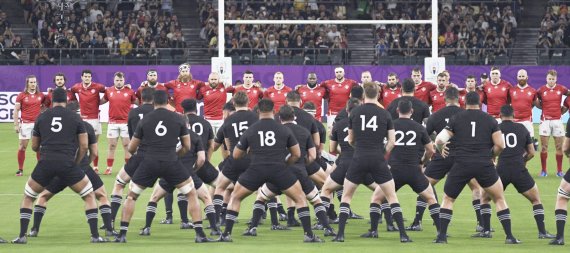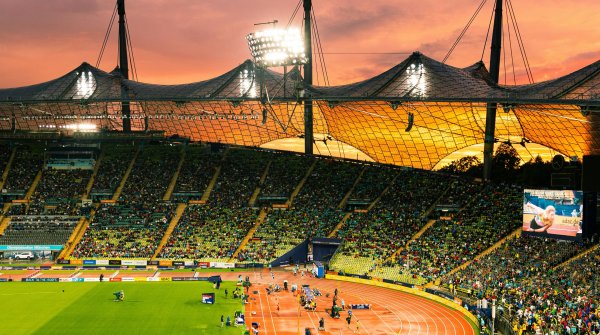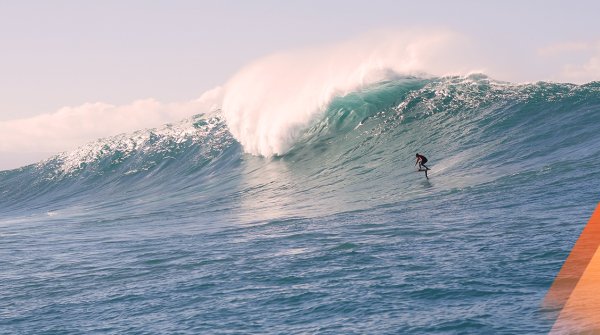
Not even one year before the Summer Olympics, another huge sports event in Japan breaks global records. ISPO.com shows why the Rugby World Cup is interesting for global players like Emirates or Mastercard and answers the most important questions about the tournament.
Japan was the first Asian country to host the Rugby World Cup. Before the tournament there was skepticism about the alleged lack of rugby enthusiasm of the Japanese, but this has long since vanished. The stadiums are full, the atmosphere is fantastic. Not least because the Japanese team has survived the group stage with surprise wins over the rugby nations Ireland and Scotland. In the quarter-finals the Japanese failed against South Africa (26:3), who won the World Champion Title.
The ninth Rugby World Cup is also the biggest so far: Japan expects 1.8 million fans for the World Cup games, and around 3 billion TV viewers worldwide. While in Europe rugby fever is "only" rampant in traditional rugby nations such as England, Ireland, Wales, Scotland and France, in the southern hemisphere it is the most popular sport.
Rugby is also becoming increasingly popular in Asia: according to Nielsen Research, there are 112 million rugby fans on the Asian continent alone. Since 2016, more than one million Japanese people have had their first rugby experience. Also because in this period 769,000 schoolchildren played the less hard variant of tag rugby in school.
But there are still markets to conquer: The German Rugby Federation for example has just 16,000 members.
Host Japan is highly satisfied. After the first week of the tournament, stadium occupancy was a strong 98 percent. No comparison to the yawning emptiness on the stands of the simultaneous World Championships in Athletics in Qatar.
For the opening match of the World Cup the Hashtag #RWC2019 was the worldwide top trend in the social media. New Zealand's first Haka alone was seen 16.5 million times via the video platform GIPHY.
Sir Bill Beaumont, Chairman of the World Rugby Federation World Rugby, expressed his enthusiasm in an official statement: "This is Japan’s moment to shine, and it is certainly doing that. From a spectacular opening ceremony, excellent rugby, vibrant fanzones and strong broadcast audiences, it has certainly been some start."
In fact, the tournament scored well on TV worldwide: the Japanese broadcaster NTV achieved an audience share of 25.5 percent at prime time in the opening match. In the UK, ITV recorded strong figures with a 20 per cent market share and viewer numbers of up to 4.7 million for England's first match against Tonga in a late morning. In France, 3.1 million spectators watched the first "Bleus" World Cup match on a Saturday morning.
While major associations such as the IOC, but also FIFA have recently lost well-known partners, the Rugby World Cup is becoming more and more interesting for corporations. The World Rugby Association has been able to win six global players as partners for the current World Cup: Emirates, Heineken, Land Rover, Mastercard, Société Générale and DHL.
Official sponsors of the tournament are Canon, TOTO Ltd, SECOM, Taisho Pharmaceutical, Mitsubishi Estate, NEC, HITO Communications and Taisei.
Eight other companies, most of them Japanese, are official tournament suppliers.
IMG, the official merchandising partner for the World Cup, announced good news one day before the start of the tournament: Merchandising sales in the official online store before the start of the tournament already exceeded those of the last World Cup 2015 in England by more than 50 percent.
The bestsellers of products shipped in 75 countries include jerseys, caps, fan clothing, towels, key rings and pins.
 Sports BusinessThe future of the bike industry: 6 innovative bike stores
Sports BusinessThe future of the bike industry: 6 innovative bike stores
- ISPO awards
- Mountain sports
- Bike
- Design
- Retail
- Fitness
- Health
- ISPO Job Market
- ISPO Munich
- ISPO Shanghai
- Running
- Brands
- Sustainability
- Olympia
- OutDoor
- Promotion
- Sports Business
- ISPO Textrends
- Triathlon
- Water sports
- Winter sports
- eSports
- SportsTech
- OutDoor by ISPO
- Heroes
- Transformation
- Sport Fashion
- Urban Culture
- Challenges of a CEO
- Trade fairs
- Sports
- Find the Balance
- Product reviews
- Newsletter Exclusive Area
- Magazine






